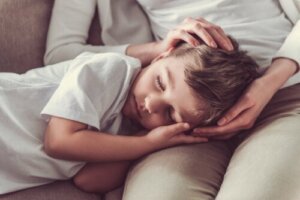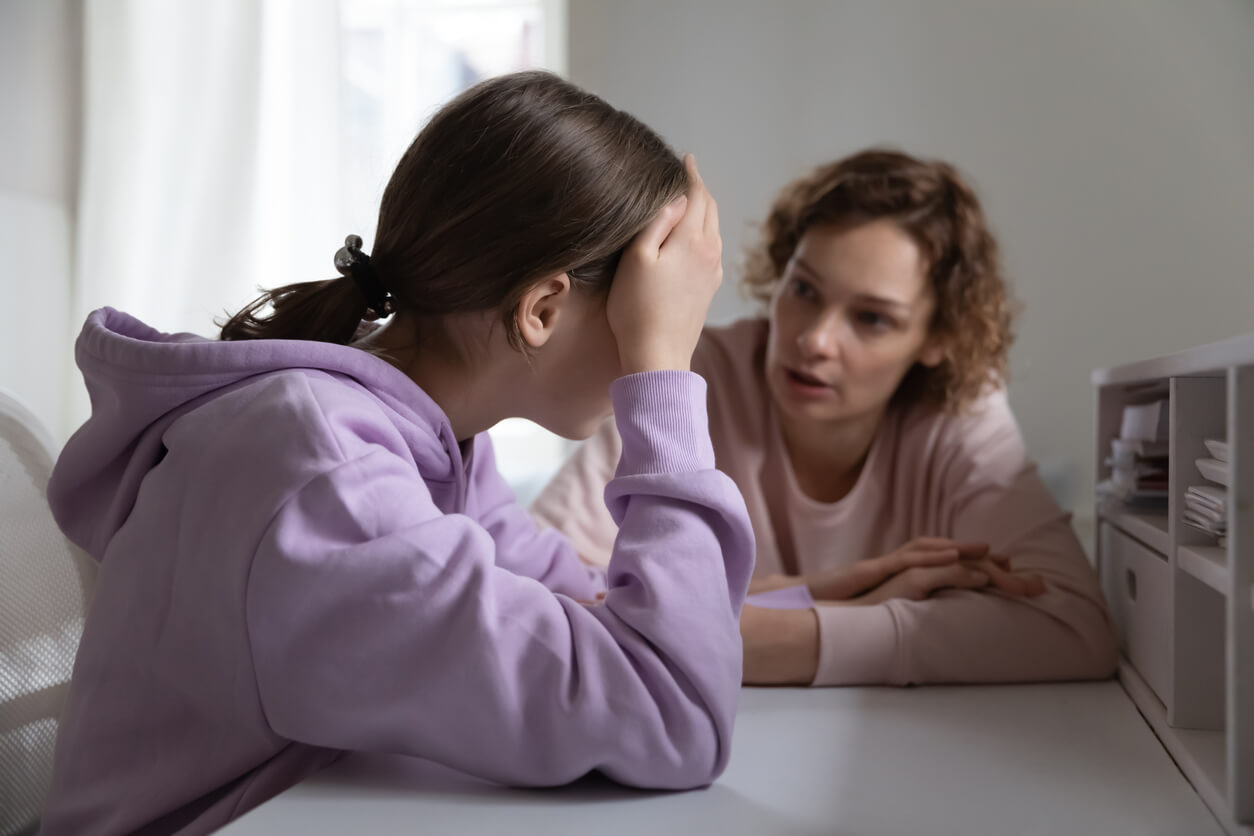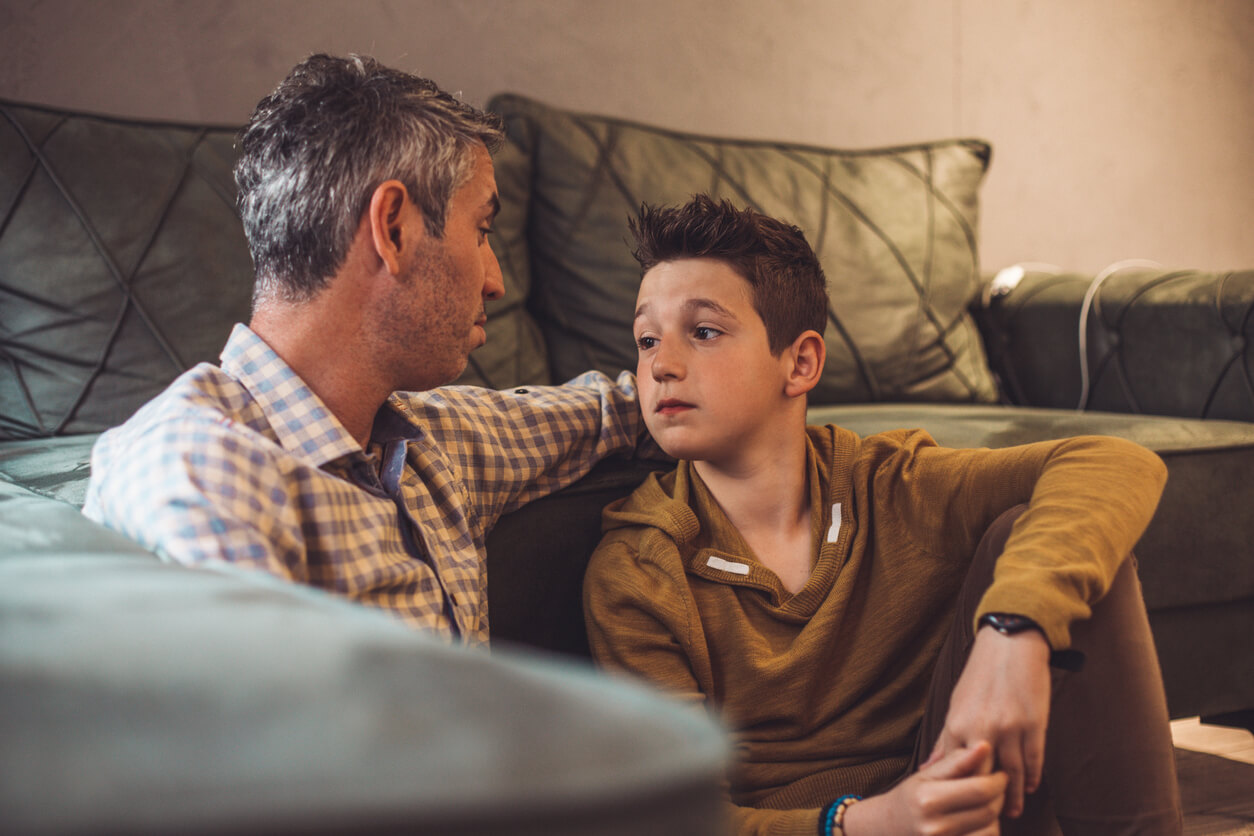Don't Raise Your Children in Fear

The world and its humanity can be very cruel and frightening. And it’s only logical that as a parent, you want to protect your little ones from any potential danger. However, don’t raise your children in fear; on the contrary, prepare them to make this world a better place despite the difficulties along the way.
It’s natural that you want to safeguard your children in a small glass bubble to prevent them from any suffering that could harm them. But, if we’re realistic, we must understand that we won’t always be able to be by their side to warn them of all the bad things that abound in the world. For this reason, it’s essential to eradicate fear from the home and aim to cultivate values that will accompany them throughout their lives and allow them to make the best decisions.
If you don’t want them to have a negative view of the world, don’t raise your children in fear
Many parents think that instilling in their children the thought that the world is a place full of potential dangers will help them identify these dangers more easily and run away from them as soon as possible. However, this idea is far from effective. For when children internalize and take these statements to heart, they become fearful of facing their day-to-day lives. This leads them to experience disorders such as anxiety and depression.

A recent academic study revealed that primal beliefs about the world (those inculcated from childhood) negatively influence children’s development when they’re raised with the idea that the world is a dangerous place and should be feared, as, in the near future, this harmful thought will only produce dissatisfaction, poorer health, poor emotional intelligence, and more suicide attempts in them.
And although it’s undeniable that not everything in the world is rosy, that doesn’t mean that we should negatively influence our children and instill erroneous ideas in them. This is because the perception we have of reality has a profound influence on personality and can inhibit children from delivering their full potential. This can even affect their emotional and physical well-being.
Children don’t need fear to defend themselves against the dangers of the world
When children are taught that the world is a scary place full of dangers, we’re only cultivating in them prejudices that will accompany them throughout their lives. And a study from the University of Washington, Tacoma, confirms that theory, as those people who live in constant worry about their safety tend to be more prone to negative stereotypes towards groups that in the collective imagination are seen as a threat.
The studies found that high beliefs that the world is dangerous predict greater negativity, safety-related concern, and fear toward groups that are stereotypically seen as threats to safety (e.g. illegal immigrants and Muslims).
Because of this, it’s critical that as a parent, you don’t teach irrational fear toward the world and some of its inhabitants, as this only creates prejudices and rigid ideas that are far from reality and only inhibits children from doing their best. For this reason, it’s not surprising that some children think things like“I won’t learn to ride a bike because I can fall and hurt myself. I’d better stay at home, safe and sound”.
Don’t raise your children in fear, rather, instruct them with sincerity
All of the above doesn’t mean that we should lie to children and make them believe that the world is a tender and harmonious place where everything always goes well. Because that’s not the truth either, and some people suffer a lot every day because of wars, natural disasters, pandemics, and human evil in general.

So, it’s important to talk to little ones about that dark side of the world, but without making them believe that their life is in constant danger. When they’re mature enough to understand these facts, we must be tactful in talking about them. Being sincere and honest, but not encouraging fear towards others, as love and kindness are also part of human beings.
For these reasons, don’t try to harden your children to protect them from potential dangers. Instead, talk to them with sincerity and motivate them to be the change that the world needs to move forward. Also, educate them by example and foster values (such as empathy, respect, kindness, and generosity) in order to help them become better people and be that point of light in the midst of the darkness that gives hope to others.
The world and its humanity can be very cruel and frightening. And it’s only logical that as a parent, you want to protect your little ones from any potential danger. However, don’t raise your children in fear; on the contrary, prepare them to make this world a better place despite the difficulties along the way.
It’s natural that you want to safeguard your children in a small glass bubble to prevent them from any suffering that could harm them. But, if we’re realistic, we must understand that we won’t always be able to be by their side to warn them of all the bad things that abound in the world. For this reason, it’s essential to eradicate fear from the home and aim to cultivate values that will accompany them throughout their lives and allow them to make the best decisions.
If you don’t want them to have a negative view of the world, don’t raise your children in fear
Many parents think that instilling in their children the thought that the world is a place full of potential dangers will help them identify these dangers more easily and run away from them as soon as possible. However, this idea is far from effective. For when children internalize and take these statements to heart, they become fearful of facing their day-to-day lives. This leads them to experience disorders such as anxiety and depression.

A recent academic study revealed that primal beliefs about the world (those inculcated from childhood) negatively influence children’s development when they’re raised with the idea that the world is a dangerous place and should be feared, as, in the near future, this harmful thought will only produce dissatisfaction, poorer health, poor emotional intelligence, and more suicide attempts in them.
And although it’s undeniable that not everything in the world is rosy, that doesn’t mean that we should negatively influence our children and instill erroneous ideas in them. This is because the perception we have of reality has a profound influence on personality and can inhibit children from delivering their full potential. This can even affect their emotional and physical well-being.
Children don’t need fear to defend themselves against the dangers of the world
When children are taught that the world is a scary place full of dangers, we’re only cultivating in them prejudices that will accompany them throughout their lives. And a study from the University of Washington, Tacoma, confirms that theory, as those people who live in constant worry about their safety tend to be more prone to negative stereotypes towards groups that in the collective imagination are seen as a threat.
The studies found that high beliefs that the world is dangerous predict greater negativity, safety-related concern, and fear toward groups that are stereotypically seen as threats to safety (e.g. illegal immigrants and Muslims).
Because of this, it’s critical that as a parent, you don’t teach irrational fear toward the world and some of its inhabitants, as this only creates prejudices and rigid ideas that are far from reality and only inhibits children from doing their best. For this reason, it’s not surprising that some children think things like“I won’t learn to ride a bike because I can fall and hurt myself. I’d better stay at home, safe and sound”.
Don’t raise your children in fear, rather, instruct them with sincerity
All of the above doesn’t mean that we should lie to children and make them believe that the world is a tender and harmonious place where everything always goes well. Because that’s not the truth either, and some people suffer a lot every day because of wars, natural disasters, pandemics, and human evil in general.

So, it’s important to talk to little ones about that dark side of the world, but without making them believe that their life is in constant danger. When they’re mature enough to understand these facts, we must be tactful in talking about them. Being sincere and honest, but not encouraging fear towards others, as love and kindness are also part of human beings.
For these reasons, don’t try to harden your children to protect them from potential dangers. Instead, talk to them with sincerity and motivate them to be the change that the world needs to move forward. Also, educate them by example and foster values (such as empathy, respect, kindness, and generosity) in order to help them become better people and be that point of light in the midst of the darkness that gives hope to others.
All cited sources were thoroughly reviewed by our team to ensure their quality, reliability, currency, and validity. The bibliography of this article was considered reliable and of academic or scientific accuracy.
- Cook, C. L., Li, Y. J., Newell, S. M., Cottrell, C. A., & Neel, R. (2018). The world is a scary place: Individual differences in belief in a dangerous world predict specific intergroup prejudices. Group Processes & Intergroup Relations, 21(4), 584–596. Recuperado de: https://doi.org/10.1177/1368430216670024
- Jeremy D. W. Clifton & Peter Meindl (2022) Parents think—incorrectly—that teaching their children that the world is a bad place is likely best for them, The Journal of Positive Psychology, 17:2, 182-197, DOI: Recuperado de: 10.1080/17439760.2021.2016907
- Paolini C. Oiberman A. Mansilla M. (2017). Desarrollo cognitivo en la primera infancia: influencia de los factores de riesgo biológicos y ambientales. Argentina: UCES; 2017. Recuperado de: http://dspace.uces.edu.ar:8180/xmlui/handle/123456789/4289
- Valdiviezo Reyes, C. B., & Léon Loaiza, B. J. (2019). La sobreprotección familiar y la incidencia en el desarrollo de la autonomía e independencia de los niños de 0 a 3 años (Bachelor’s thesis). Recuperado de: http://repositorio.unemi.edu.ec/xmlui/handle/123456789/4763?locale-attribute=en
This text is provided for informational purposes only and does not replace consultation with a professional. If in doubt, consult your specialist.








